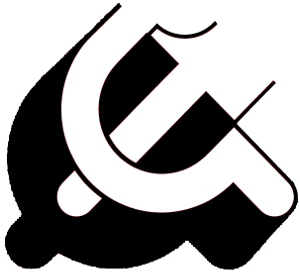Even where there is no prospect of achieving their election the workers must put up their own candidates to preserve their independence, to gauge their own strength and to bring their revolutionary position and party standpoint to public attention. They must not be led astray by the empty phrases of the democrats, who will maintain that the workers’ candidates will split the democratic party and offer the forces of reaction the chance of victory. All such talk means, in the final analysis, that the proletariat is to be swindled. The progress which the proletarian party will make by operating independently in this way is infinitely more important than the disadvantages resulting from the presence of a few reactionaries in the representative body (Karl Marx and Friedrich Engels, Address of the Central Committee to the Communist League, March 1850)
Taubira, a new « left » candidate
The last candidacy to date for the French presidential election is that of Christine Taubira. Her first campaign leaflet claims that it would be a question of “winning the left”.
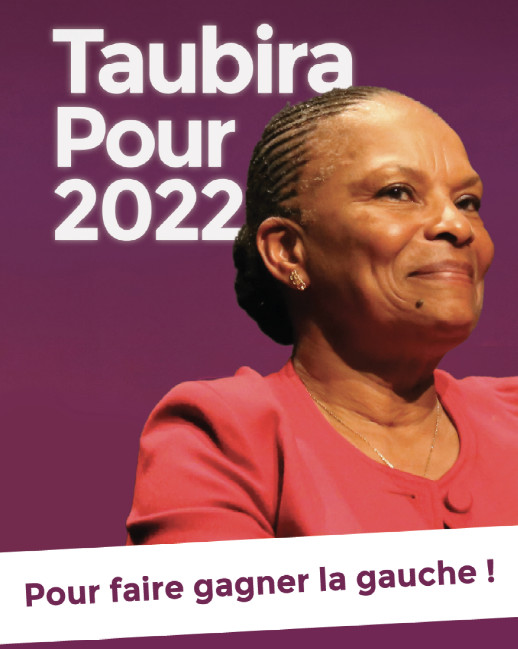
However, according to a bourgeois daily often classified as “left”, « her candidacy is added to the long list of left-wing candidates for the presidential election » (Le Monde, January 16) and for the newspaper founded by Jaurès and then turned Stalinist, « the appointment by the popular primary will not settle the question of the traffic jam and the division on the left” (L’Humanité, January 15).
The workers legitimately feel that the competition between parties which basically say the same thing (this is the case with the La France Insoumise-LFI, the Parti Communiste Français-PCF and the Parti Socialiste-PS), as well as the deplorable multiplication of trade unions, weakens them in the face of an enemy who is unified through the bourgeois state.
As many workers have the illusion that the presidential elections are decisive, they are worried about the multiplicity of « left » candidates which in April 2022 would rule out any hope of change for 5 years. The instigators Primary on the left are banking on this sentiment.
However, in 1981, the competition in the first round between Mitterrand (PS), Marchais (PCF), Laguiller (LO) and Bouchardeau (PSU) – not to mention that of Crépeau (PRG, a remnant of the main bourgeois party of the 3rd Republic, the Parti Radical de Gauche) and Lalonde (MEP, an ecologist coalition) – did not prevent Mitterrand’s electoral victory in the second round. It is the current electoral weakness of all the parliamentary workers’ parties (PS, PCF, LFI) that needs to be explained.
Why do the candidates of the labour movement have so little echo today?
Mélenchon, a former Minister of the Fifth Republic (2000-2002) who splinted from the PS in 2008 to found the PdG, then LFI, would obtain 9.5% of the votes; Hidalgo, PS mayor of Paris, 3.5%; Roussel, national secretary of the PCF, 2%; Poutou, a factory worker and NPA candidate, 1%; Arthaud, a professor and LO candidate, 0.5%; Kazib, a railway worker and candidate of the CCR-RP, a dissident of the NPA, even less.
The weakening of the labour movement is a global phenomenon. It stems above all from the decision, taken in 1989-1992 by the privileged bureaucrats who usurped power, to restore capitalism in the “socialist countries” of Eastern Europe, Russia, China and Vietnam.
The second explanation is the repeated betrayal of the working class in countries that had remained capitalist. Since the 1980s, under the pressure of unemployment and threats of relocation, the leaderships of the big unions have accompanied the capitalist counter-offensive against previous gains. With the return of the world capitalist crises, the “Labour”, “Social Democratic”, “Socialist” or “Communist” parties, when they acceded to the government alone or in alliance with bourgeois parties, did not grant reforms favourable to the exploited, but instead applied austerity and militarism.
That is why people who pronounce themselves in favour of the method of legislative reform in place and in contradistinction to the conquest of political power and social revolution, do not really choose a more tranquil, calmer and slower road to the same goal, but a different goal. (Rosa Luxemburg, Social reform or Revolution?, 1898)
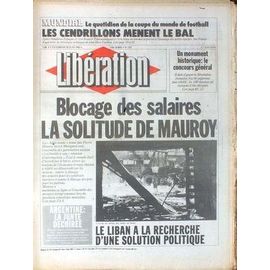
This was the case, in France, with governments of the Union de la Gauche under Mitterrand (PS-PCF-PRG in 1981-1984, PS-PRG in 1984-1986), of the Gauche Plurielle with Jospin (PS-PCF-EELV -PRG in 1997-2002), under Hollande (PS-PRG-EELV in 2012-2014, PS-PRG in 2014-2017). Like the governments of Lula in Brazil, Bachelet in Chile, Blair in Britain, Schröder in Germany, Gonzalez in Spain, Tsípras in Greece, Costa in Portugal, Di Rupo in Belgium, Löfven in Sweden, Lipponen in Finland… they governed on behalf of their bourgeoisie, to defend capitalism. Failing to improve the lot of the producers, contemporary “reformist” parties reduce their reforms to aspects that cost nothing to capital (for example, rights granted to homosexuals). The desperate search for an electoral base to access political positions sometimes leads them to imitate the powerless environmentalist parties (like the PS and Generations) and the dangerous xenophobic parties (PCF), or even both at the same time (LFI).
The class collaboration which was carried out in a complementary way by the treacherous parties and by the trade union bureaucracies has led to the defeats of social struggles, to social setbacks, to political disappointments, to ideological disarray and to the weakening of the proletarian traditions.
The trade union confederations and the traditional workers’ parties are themselves weakened. Not for the benefit of a Workers’ International, given the disappearance of the Communist International and even of the 4th International. Interclassist substitutes then appear, such as movements for the defence of the environment or movements limited to the fight against one type of oppression. The disorientation and scepticism of the working ranks facilitates the resurgence of populist demagogues, xenophobic parties and fascist organizations around the world. Inevitably, this was reflected in the electoral consultations, in the double form of the drop in votes and of the rise in abstention, especially after the experience of the exercise of power by the social-imperialist parties.
In Capitalism, nothing decisive is decided through election
Elections and referendums are important moments in the political life of most capitalist countries. But they only conceal the domination of the bourgeoisie, which reigns by its economic, political and ideological force.
Bourgeois democracy, although a great historical advance in comparison with medievalism, always remains, and under capitalism is bound to remain, restricted, truncated, false and hypocritical, a paradise for the rich and a snare and deception for the exploited, for the poor. (Vladimir Lenin, The Proletarian Revolution and the Renegade Kautsky, 1918)
If the result of its democracy is not the desired outcome, the ruling class corrupts, intimidates, even overthrows the government without respecting the democratic rules which it demands respect when they are favourable to it. Thus, the National Assembly elected in 1936 banned the PCF in 1939 and entrusted power to Marshal Pétain. Thus, General de Gaulle returned to power in 1958 following a military coup. Thus, General Pinochet, appointed minister by Allende in 1973, crushed the proletarian revolution in Chile and overthrew the legal government in passing. Thus, the Brazilian justice dismisses the elected president Rousseff in 2016.
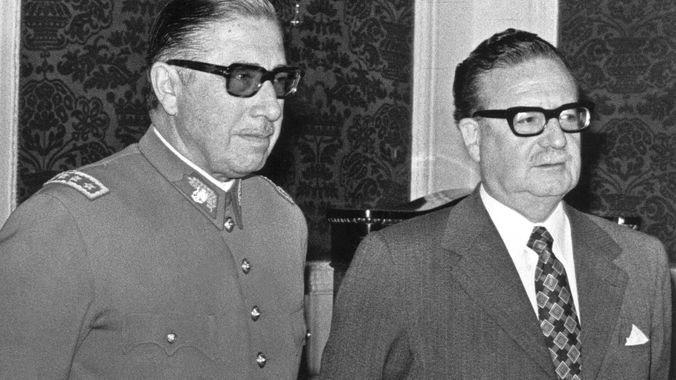
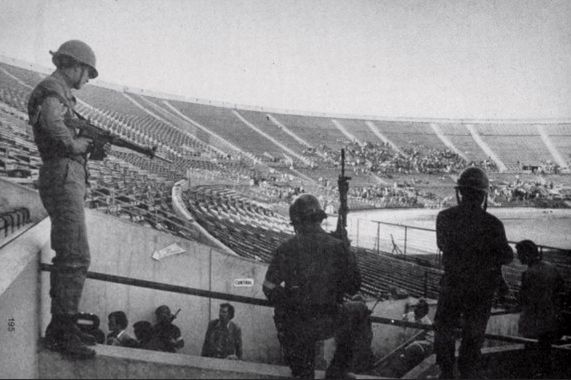
Revolutionary communists, unlike anarchists and leftists, are never indifferent to political regimes (they are hostile to fascism, to monarchy, to Bonapartism, to presidentialism, to all institutional discrimination, to parliamentary bodies that were not elected by direct universal suffrage, to State religions and to any subsidy of a religious cult…). They defend and extend the democratic freedoms (the right to vote for all workers, the right to organize, the right to express oneself including against religion, to strike, equality before the courts, etc.)
The proletariat too needs democratic forms for the seizure of political power but they are for it, like all political forms, mere means. (Friedrich Engels, “Letter to Bernstein”, March 14, 1884)
As shown before the First World War by the sections of the Workers’ International (German SPD, French PO, American SPA, Russian POSDR, etc.), as well after the Russian revolution of 1917 by the sections of the Communist International (French PC-SFIC, Italian PCdI, German KPD…), a revolutionary workers’ party has the right and the duty to participate in the bourgeois elections in order to build itself, to address all workers in the cities and the countryside, to prepare the revolution. However, a revolutionary workers’ party does not sow electoral and pacifist illusions.
Do you realise now what a splendid weapon you in France have had in your hands for forty years in universal suffrage… it indicates with the most perfect accuracy the day when a call to armed revolution has to be made. (Friedrich Engels, “Letter to Lafargue”, November 12, 1892)
Elections are not the ground of the Workers’ United Front
In the class struggle, revolutionary communists fight for the unity of the working class, for the front of all its mass organizations against the bourgeoisie.
To all working-class organizations, we offer a concrete program of action on the basis of the proletarian united front. Beginning today, we see active proletarian self-defence as the main task. Force against force! (Lev Trotsky, “A Call for Action and Regroupment After the French and Austrian Events”, March 9, 1934)
However, the revolutionary organization cannot give up criticizing its temporary partners or asserting its program. Therefore, in bourgeois elections, he cannot renounce its candidacies in the name of workers’ unity.
The idea of nominating a candidate for president on the part of the united workers’ front is at its root a false one. A candidate can be nominated only on the grounds of a definite program. The party has no right to sacrifice during elections the mobilization of its supporters and the census of its strength. The party candidacy, in opposition to all other candidates, can in no instance conflict with any agreement made with other organizations for immediate aims of struggle. (Lev Trotsky, “What Next?”, January 27, 1932)
If the revolutionary workers’ party is not in a position to present candidates, it can call on the workers who can and want to vote, to go, against any ballot for the bourgeois parties, to the candidacies of other political currents of the workers’ movement. But certainly not because he expects them to lead to socialism.
The ILP should have given critical support to all Labour Party candidates, where the ILP was not contesting… At the same time telling the workers that the Labour Party would function as a capitalist government. (Lev Trotsky, “Once again the ILP”, November 1935,)
In any case, the workers’ united front for action is the exact opposite of the popular front at the ballot box and of the government of the bourgeois state, whether the latter is called a union of the left, plural left, left front, popular unit or other.
The union of “left forces” still camouflages class collaboration
To the illusionary democracy under capitalism, the bourgeoisie must add the myth of the union of the whole “nation” and, incidentally, the false opposition between “the left” and “the right”.
Taubira, Jadot and Montebourg are above all bourgeois candidates. Montebourg left the PS to become a capitalist. Jadot is the apparatchik of a party that was born outside the labour movement and integrated into bourgeois politics like its sister parties in Ireland, Austria and Germany. Taubira was a member from 2012 to 2016 of the governments under Hollande which unravelled labour law, which damaged public health and education, which intervened militarily in Africa. She was not only vice-president of the PRG from 2002 to 2012 but she voted in 1993, as deputy of Guyana, in favour of the nomination of the Balladur government (member of the RPR, the ancestor of LR). In continuity, she defends the repressive apparatus of the bourgeois state.
I understand the needs of a strong State, I know the need to respond to sovereign missions. (Christiane Taubira, “Declaration of candidacy”, Lyon, January 15)
Since the entry of the PS-SFIO into the government of sacred union in 1914 and since the adoption by the PCF of the alliance with the Radical Party in 1935, it has been proved that these blocks with the political representatives of the bourgeoisie can only be done in defence of the bourgeois state and capitalism.
In order to justify the politics of the Popular Front they invoked the necessity for an alliance between the proletariat and the petty- bourgeoisie. It is impossible to imagine a more scurrilous lie! The Radical party expresses the interests of the big bourgeoisie, and not of the petty. By its very essence it represents the political machinery of the exploitation of the petty bourgeoisie by imperialism. The alliance with the Radical party is, consequently, an alliance not with the petty bourgeoisie, but with their exploiters. (Lev Trotsky, “The Decisive Hour in France”, December 18, 1938)
This was confirmed by the participation of the PS-SFIO and the PCF in de Gaulle’s government of national unity in 1945, which disarmed the workers and consolidated the repressive apparatus of the state, putting French capitalism back in the saddle and crushing the colonial peoples.
The candidates Mélenchon, Hidalgo and Roussel are the avowed disciples of Mitterrand and Marchais, of the leaders of the 1970s and 1980s Union de la gauche. Candidates Mélenchon, Hidalgo and Roussel even rival Macron, Pécresse, Le Pen and Zemmour in reverence for de Gaulle.
General de Gaulle’s obsession with independence, even against seemingly so powerful forces, is a form of heroic insubordination that should serve as a model. (Jean-Luc Mélenchon, June 10, 2020)
Even if Mélenchon, Hidalgo and Roussel rightly refuse to withdraw their candidacies today against those of Jadot, Taubira and Montebourg, they are reaching out to them to govern tomorrow with them…
If I reach the second round, I will ask those who want to join a majority and enter into dialogue with me to govern. (Jean-Luc Mélenchon, “Speech at the meeting in Nantes”, January 16)
By this, as by their defence of the bourgeois police and army, they announce that they will betray the working class.
“Trotskyists” who unite with the corpse of the Radical Party?
Instead of a bourgeois and Social-Democracy coalition, whether open or disguised, Communists propose the united front of all workers and a coalition of all workers’ parties. (4th congress of the Communist International, “On the Tactics of the Comintern”, November 1922)
Like the union bureaucrats of the CGT, SUD and FSU, to which they are bound hand and foot, the centrists Kazib, Arthaud and Poutou accept the terms of the bourgeoisie, namely that « politics » would be the terrain of opposition between “the right” and “the left”. Officially, they are all “revolutionary”, like the POI and the POID, which compete in chauvinism with the LFI and the PCF. As those who believe in unicorns (the “good” reformists) proclaim themselves “Trotskyists” such as the POI, Ensemble, the GR, Révolution, the CLAIRE-NPA who campaign for Mélenchon against Roussel and Hidalgo (who would be the “bad” reformists) but also against Poutou, Arthaud and Kazib (whom they consider as “dividers”).
The CCR-RP, which tries to present Kazib against Poutou and Arthaud, appears as new. In reality, it draws its origin from an old Argentinian revisionist current (Morenoism) which entered in 1957 in a bourgeois nationalist party, the Justicialist Movement of Colonel Perón.

LO comes from a French revisionist group (Hardyism) which was born, at the same time, from the adaptation to the Stalinist party PCF, supporter since 1935 of the alliance with its bourgeoisie.
The leadership of the NPA itself comes from an international revisionist current (Pabloism-Mandelism) which had subordinated itself at the same time to world Stalinism and to bourgeois nationalism to the point of providing an adviser (Pablo) to the first president of the Algerian bourgeois state, Ben Bella.
Since 1981, LO and the LCR (the ancestor of the NPA) have more than once called for voting for “the left”, including bourgeois parties such as the remnants of the old Parti Radical or the new ecologist parties. LO presents the policemen as workers. The LCR had even called for a vote for Chirac in 2002. LO and LCR-NPA themselves practised electoral alliances with bourgeois formations (MRC, PRG, EELV, etc.).
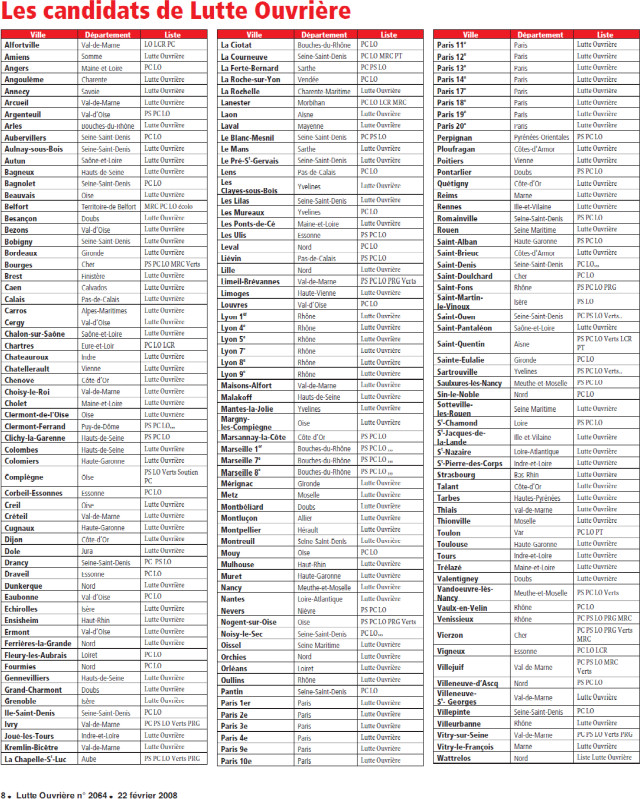
All these centrist capitulations, which announce others capitulations for more decisive moments, have nothing to do with the heritage of the organizer of the October 1917 uprising, the leader of the Red Army and the founder of the 4th International.
The chief accusation which the Fourth International advances against the traditional organizations of the proletariat is the fact that they do not wish to tear themselves away from the political semi-corpse of the bourgeoisie. (Lev Trotsky, The Agony of Capitalism and the Tasks of the 4th International, September 1938)
For class independence
The classes prove their existence every day; on the other hand, no one has ever known how to define “the left” and “the right”, no one has ever known how to draw the border between “the left” and “the right”. The real struggle is between the classes. The Popular Front, the Union of the Left, the Popular Unity, etc. mask it, hindering the class struggle of the proletariat.
We need genuine, revolutionary, fighting unity: for the resistance against fascism, for the defense of our right to live, for an irreconcilable struggle against bourgeois rule, for the full conquest of power, for the dictatorship of the proletariat, for the workers’ state, for the Soviet United States of Europe, for the Socialist World Republic. (Lev Trotsky, “Call for Action and Regroupment After the French and Austrian Events”, March 9, 1934)
- Break with the bourgeoisie! No vote for its political representatives (Zemmour, Le Pen, Pécresse, Macron, Taubira, Jadot…), neither in the first nor in the second round!
- Make the bourgeois elections a platform for the demands of the workers and the proletarian methods of uprooting the latter!
- Self-defence of the workers! Workers’ government! United Socialist States of Europe!
- Construction of a real communist party within the framework of the revolutionary Workers’ International!
